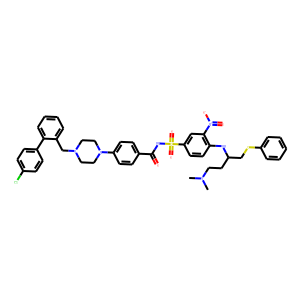| InChI | InChI=1S/C42H45ClN6O5S2/c1-46(2)23-22-35(30-55-37-9-4-3-5-10-37)44-40-21-20-38(28-41(40)49(51)52)56(53,54)45-42(50)32-14-18-36(19-15-32)48-26-24-47(25-27-48)29-33-8-6-7-11-39(33)31-12-16-34(43)17-13-31/h3-21,28,35,44H,22-27,29-30H2,1-2H3,(H,45,50)/t35-/m1 |
| Reference | 1. Leuk Lymphoma. 2011 Jun;52 Suppl 2:79-81. doi: 10.3109/10428194.2011.569961. <br />
Enhancing immunotoxin cell-killing activity via combination therapy with ABT-737. <br />
Fitzgerald DJ(1), Moskatel E, Ben-Josef G, Traini R, Tendler T, Sharma A,
Antignani A, Mussai F, Wayne A, Kreitman RJ, Pastan I. <br />
Author information: <br />
(1)Laboratory of Molecular Biology, CCR, National Cancer Institute, NIH, HHS,
Bethesda, MD, USA. [email protected] <br />
Immunotoxins are antibody-toxin fusion proteins directed to kill cancer cells
displaying specific target antigens on their surface. Remarkably, immunotoxins
directed to CD22 on hairy cell leukemia have produced complete remissions in
approximately 60% of patients enrolled in phase I/II trials. For reasons that are
not yet clear, 40% of patients responded less well. In addition, patients with
other CD22-positive malignancies have not yet achieved complete remissions. In
trying to understand /’resistance/’ to immunotoxin therapy, a number of challenging
issues have been raised. These include insufficient dosing, the production of
neutralizing anti-immunotoxin antibodies, poor access to malignant cells, and
resistance to toxin killing. In designing immunotoxins, we employ truncated
Pseudomonas exotoxin, which enzymatically inactivates protein synthesis and
produces cell death in sensitive cells. To begin to address toxin resistance we
have explored combination therapy with the BH3-only mimetic, ABT-737. Our results
indicate that immunotoxin-ABT combinations often exhibit greater killing activity
than either compound alone and in some instances overcome resistance. Expression
of high levels of prosurvival Bcl-2 proteins may contribute to toxin resistance. <br />
2. Curr Top Med Chem. 2007;7(10):961-5. <br />
Small molecule inhibition of the Bcl-X(L)-BH3 protein-protein interaction:
proof-of-concept of an in vivo chemopotentiator ABT-737. <br />
Stauffer SR(1). <br />
Author information: <br />
(1)Department of Medicinal Chemistry, Merck Research Laboratories, WP14-3 P.O.
Box 4, West Point, PA 19486, USA. [email protected] <br />
<br />
The Bcl-2 family of anti-apoptotic proteins are key regulators of programmed cell
death. Bcl-2 and its closely related Bcl-X(L) counterpart are one of several
pro-survival proteins which can share up to four highly conserved domains known
as the BH1, BH2, BH3 and BH4 domains. These domains form the basis of a well
defined groove whereupon a heterodimeric protein-protein interaction can occur
with pro-apoptotic BH3 proteins such as Bad, Bid and Bim. Extensive evidence
clearly indicates a strong correlation between neoplastic progression and
deregulation of apoptotic pathways. Overexpression of Bcl-X(L) is associated with
tumor progression, poor prognosis and resistance to chemotherapy. Antagonism of
Bcl-X(L) is therefore viewed as a means to mimic the endogenous apoptotic
pathways initiated by Bad, Bid and other pro-apoptotic proteins. Several
successful approaches to block the Bcl-X(L)-BH3 binding groove have been reported
but only recently have proteomimetics been found which could prove to be
clinically useful as new anticancer agents capable of overcoming apoptosis
resistance. ABT-737 is an example of one of the first small-molecule inhibitors
of Bcl-2/X(L) proteins shown to be efficacious in vivo, causing complete
regression in small-cell lung carcinoma tumour xenografts in mice. This review
will focus on the recent advances surrounding the non-peptidic Bcl-2/X(L)
inhibitor ABT-737 developed by Abbot laboratories and highlight the key
structural characteristics found within this unique BH3 alpha-helical mimetic.
|

